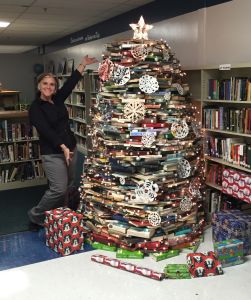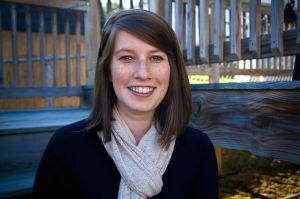By Melody Simpson
Becky Ryder, Read Aloud school coordinator and Title I reading teacher at Weimer Elementary School in Saint Albans, had three problems to solve: how to get her students more interested in reading, how to get books into their hands and homes, and how to get parents involved, both at the school and in their children’s success? Fortunately, she and the school came up with an innovative approach to address all three.
In January 2016, Weimer hosted a “Muffins with Moms” event one morning between 7:00 and 8:00 a.m., to catch moms (as well as grandmothers and other caregivers) as they were dropping off children at school. (Notices were sent home to alert them in advance.) On another morning in February, the school hosted “Donuts with Dads.” Both events were wildly successful, with 40 to 50 adults attending each one (counting the children, over 100 attended each event). The parents were welcomed and given snacks and drinks, and their children were permitted to choose a free book from a varied selection provided by Read Aloud. Parents then read the books to (or with) their children before the regular school day began.
“The first event was held in the school’s library, but we had so many attending it spilled over into my classroom,” Ryder commented. They moved the “Dads” event into the cafeteria to avoid this “wonderful” overcrowding problem. Ryder believes the timing of the events was key to their success. “When we’ve had family nights or PTO events in the evening, attendance has tended to be very low,” Ryder said. They were thrilled to have so many of the parents attending each event.
Ryder is passionate about making all Weimer students lifelong readers, but she recognizes that many of them face significant hurdles, not the least of which is simply the absence of books to read at home. She hopes to have some sort of book event once a month next year, if finances permit, during which students will be able to choose a book to take home. In addition, since many Weimer students do not live in traditional or stable housing, she plans to provide book bags to hold the students’ personal libraries. A Little Free Library was installed on the school grounds in May and Ryder also intends to request visits from the Kanawha County Public Library’s Bookmobile.
Ryder was extremely grateful to Read Aloud for the books: she commented the group even was able to provide her with books that were likely to appeal to men for the “Dads” event. She hopes she can replicate the success of “Muffins with Moms” and “Donuts with Dads” next school year.
Melody Simpson is an attorney at Bowles Rice LLP, a volunteer reader and member of the Read Aloud board and newsletter committee.























 individuals from places like Nigeria, Haiti, Spain, New York, Canada, Nepal, California, and India? The answer is that she, like them, was recognized in September in the International Literacy Association’s “30 Under 30” list as an innovative young leader helping to transform literacy world-wide.
individuals from places like Nigeria, Haiti, Spain, New York, Canada, Nepal, California, and India? The answer is that she, like them, was recognized in September in the International Literacy Association’s “30 Under 30” list as an innovative young leader helping to transform literacy world-wide.